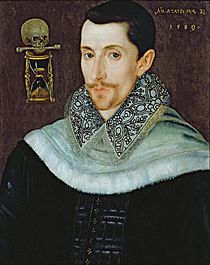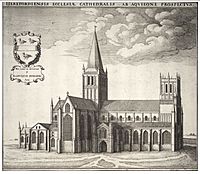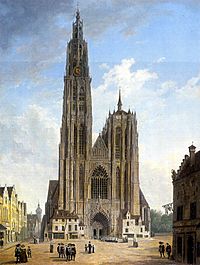John Bull (composer) facts for kids
John Bull (1562/63 – 12/13 March 1628) was an English composer, organist, virginalist and organ builder. He was a renowned keyboard performer of the virginalist school and most of his compositions were written for this medium.
Life and career
Bull's place of birth is uncertain. In an article published in 1952, Thurston Dart presumed that Bull's family originated in Somerset, where it is possible the composer was born. Recent research by Susi Jeans suggests that Bull was born in the Radnorshire parish of Old Radnor within the Diocese of Hereford, although no birth records have yet been discovered. Bull's appointment as organist of Hereford Cathedral in 1582 lends credence to this diocese being his place of birth: it was customary at this time for organists to return to their home cathedrals after training in London (cf: Thomas Morley).
In 1573 he joined the choir at Hereford Cathedral, and the next year joined the Children of the Chapel Royal in London, where he studied with John Blitheman and William Hunnis; in addition to singing he learned to play the organ at this time. After being appointed to the Merchant Taylor's Company in 1577–78, Bull received his first appointment as organist of Hereford Cathedral in 1582, and then became Master of the Children there.
In 1586 he received his degree from Oxford, and he became a Gentleman of the Chapel Royal that same year. In 1591, following the death of John Blitheman, he became organist at the Chapel Royal; in 1592 he received his doctorate from Oxford, and in 1596 he became the first professor of music at Gresham College on the recommendation of Queen Elizabeth, who admired him. There is some evidence that she sent Bull on espionage missions: his eighteen-month trip to the continent in 1601–02, ostensibly for health reasons, has never been satisfactorily explained, and his whereabouts there, apart from a visit to Brussels, then in the Spanish Netherlands, remain a mystery. On the death of Elizabeth, he entered into the service of King James, establishing a reputation as a skilled composer, keyboard performer and improviser.
Ten years later, he was forced to leave his post at Gresham College on 20 December 1607 and move to Flanders. He married Elizabeth Walter in 1607, by whom he had a daughter.
He was briefly employed at the Brussels court, but was released after Trumbull communicated King James's displeasure; he continued to receive money from the court until 1618. In 1615 Antwerp Cathedral appointed him as assistant organist, and as principal organist in 1617. Bull wrote a series of letters while in Flanders, including one to the mayor of Antwerp, claiming that the reason he left England was to escape religious persecution.
In the 1620s he continued his career as an organist, organ builder and consultant. He died in Antwerp and was buried on 15 March 1628 in the cemetery next to the cathedral.
Works
Bull was one of the most famous composers of keyboard music of the early 17th century, exceeded only by Jan Pieterszoon Sweelinck in the Netherlands, Girolamo Frescobaldi in Italy, and, some would say, by his countryman and elder, the celebrated William Byrd. He left many compositions for keyboard, some of which were collected in the Fitzwilliam Virginal Book.
His first (and only) publication, in 1612 or 1613, was a contribution of seven pieces forming part of a collection of virginal music entitled Parthenia, or the Maydenhead of the First Musicke That Ever Was Printed for the Virginalls, dedicated to the 15-year-old Princess Elizabeth, who was his student, on the occasion of her betrothal to Frederick V, Elector Palatine of the Rhine. The other contributors to Parthenia were Bull's contemporaries William Byrd and Orlando Gibbons, among the most famous composers of the age. Bull also wrote an anthem, God the father, God the son, for the wedding in 1613 of the princess and the Elector Palatine.
In addition to his keyboard compositions, he wrote verse anthems, canons and other works.
His 5-part anthem Almighty God, which by the Leading of a Star, known colloquially as the Star Anthem, was the most popular Jacobean verse anthem, occurring in more contemporary sources than any other.
Much of his music was lost when he fled England; some was destroyed, and some was stolen by other composers, though occasionally such misattributions can be corrected today based on stylistic grounds. One of the most unusual collections of music from the period is his book of 120 canons, an astonishing display of contrapuntal skill worthy of Ockeghem or J.S. Bach. Of the 120 canons, 116 are based on the Miserere. Techniques employed to transform the simple theme include diminution, augmentation, retrograde and mixed time signatures. Some of his music in the Fitzwilliam Virginal Book is of a lighter character and uses whimsical titles: "A Battle and No Battle," "Bonny Peg of Ramsey," "The King's Hunt," and "Bull's Good-Night."
He is sometimes credited with the composition of "God Save the King", the national and/or royal anthem of a number of Commonwealth realms, their territories, and the Crown Dependencies.
See also
 In Spanish: John Bull (compositor) para niños
In Spanish: John Bull (compositor) para niños
- List of Gresham Professors of Music




